Indonesia’s presidential candidates are posting light content on social media in a push to appeal to young voters, dressing up like Tom Cruise in Top Gun, organizing dance contests or forgetting to turn off a livestream.
In a country where millennials and Gen-Zers make up more than half the electorate, candidates Indonesian Minister of Defense Prabowo Subianto and former provincial governors Anies Baswedan and Ganjar Pranowo’s ages range from 54 to 72.
With the power to swing Indonesia’s youth vote, TikTok, Instagram and other platforms have become crucial tools in the arsenal of those vying to replace Indonesian President Joko Widodo.
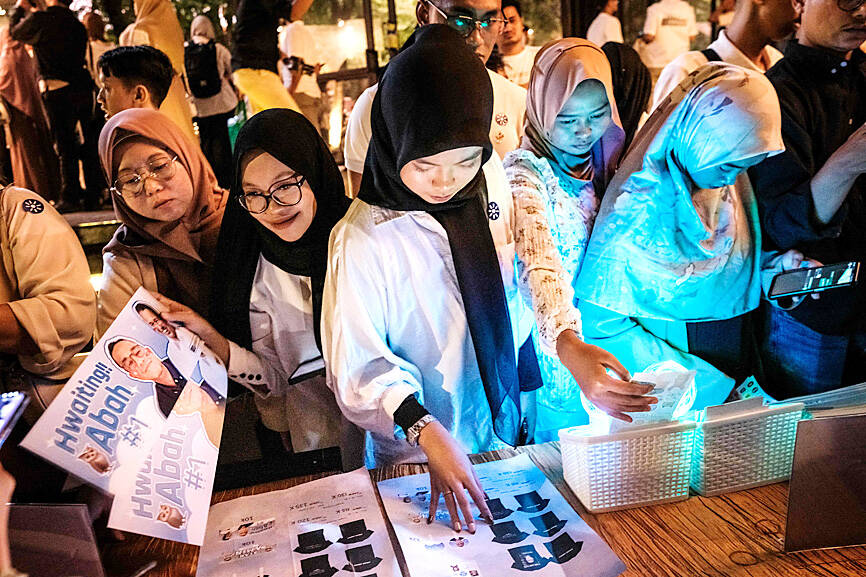
Photo: AFP
Indonesia is home to 278 million people, and 125 million are on TikTok alone.
“Today, the battlezone is on TikTok,” Angga Putra Fidrian of Baswedan’s presidential team said.
Facebook and Twitter were the dominant platforms in the 2019 election, but this time around the Chinese-owned app has become dominant.
After the first vice presidential debate last month, clips from the broadcast were viewed 300 million times in 12 hours on TikTok, with three-quarters uploaded by candidate-linked users, analyst Hokky Situngkir of social research institute Bandung Fe said.
Videos of 72-year-old front-runner Subianto dancing have flooded Indonesian social media accounts, transforming his image from a retired general accused by non-governmental organizations of ordering the abduction of democracy activists in the late 1990s to “cute grandpa.”
His campaign for the presidency has held dance competitions to mimic him, offering a prize of hundreds of millions of rupiah (thousands of US dollars).
“I see this phenomenon as a natural one,” Subianto’s digital campaign coordinator Anthony Leong said, adding that about 15,000 people are supporting his online campaign.
Baswedan, second in the polls, has gone viral for holding two TikTok livestreams — and endearing supporters by showing confusion over how to turn off the broadcast.
It earned him the new nickname “online father” from his audience.
“We don’t need him to appear in a complicated way, just be himself as usual,” Fidrian said.
Pranowo, who was already active on Instagram and TikTok during his two terms as Central Java governor, has engaged in streaming duets with other prominent political figures and local TikTok influencers.
After the second presidential debate this month, the silver-haired candidate went live on TikTok dressed in a green military bomber jacket, posing like Tom Cruise from his film franchise Top Gun.
It is not only presidential candidates using social media for their campaigns. At a house in Tangerang, just west of Jakarta, a local councilor candidate was joined by a group of women to craft a TikTok video for his campaign linked to Pranowo’s party.
One took center stage shouting: “Move aside, everyone! My candidate will never get you bored!” to laughs and cheers as the spotlight turned to the councilor.
The clips were put to an upbeat soundtrack and uploaded the next day, capturing thousands of views within hours.
“Using social media to campaign is more cost efficient... so our campaigning messages can go directly to their hands,” said Ukon Furkon Sukanda, a legislative candidate of the Indonesian Democratic Party of Struggle.
However, some young Indonesians say they are looking for more serious content to help inform their electoral choices.
“I want a comparison, what’s good about this candidate, what’s good about that candidate,” said Annisa Ayu Shafira, a 21-year-old university student.
While scores of videos making the rounds appear to be made by followers with no connection to the campaign, some Indonesians suspect much of the content they are seeing was paid for.
“Who is genuine? Who is pretending to be genuine? I am often confused because there are so many buzzers,” said 17-year-old Nurul Lathifatul Azizah, who will be voting for the first time.
Paid or not, the social media rewards are ultimately worth it for the candidates seeking office.
“In 2024, whoever dominates TikTok will win all of the social competition,” Situngkir said.
“Whether it is business, political competition, or the election,” he said.
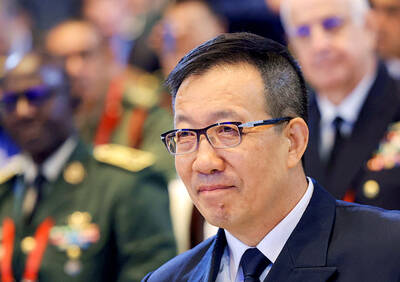
BEIJING FORUM: ‘So-called freedom of navigation advocated by certain countries outside the region challenges the norms of international relations,’ the minister said Chinese Minister of National Defense Dong Jun (董軍) yesterday denounced “hegemonic logic and acts of bullying” during remarks at a Beijing forum that were full of thinly veiled references to the US. Organizers said that about 1,800 representatives from 100 countries, including political, military and academic leaders, were in Beijing for the Xiangshan Forum. The three-day event comes as China presents itself as a mediator of fraught global issues including the wars in Ukraine and Gaza. Addressing attendees at the opening ceremony, Dong warned of “new threats and challenges” now facing world peace. “While the themes of the times — peace and development —
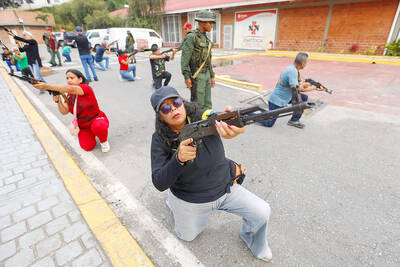
Venezuela on Saturday organized a day of military training for civilians in response to the US deployment in the Caribbean, and amid new threats from US President Donald Trump. About a month ago, Washington deployed warships to international waters off Venezuela’s coast, backed by F-35 jets sent to Puerto Rico in what it calls an anti-drug and anti-terrorism operation. Venezuelan Minister of Defense Vladimir Padrino Lopez has accused Washington of waging “undeclared war” in the Caribbean, after US strikes killed over a dozen alleged drug traffickers off his country’s coast. Caracas also accused the US of seeking regime change, and
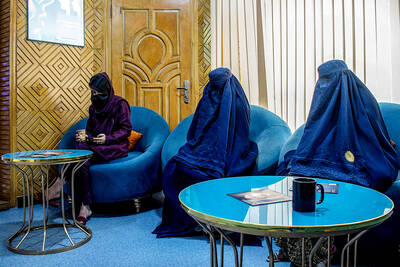
Decked out with fake crystal chandeliers and velvet sofas, cosmetic surgery clinics in Afghanistan’s capital are a world away from the austerity of Taliban rule, where Botox, lip filler and hair transplants reign. Despite the Taliban authorities’ strict theocratic rule, and prevailing conservatism and poverty in Afghanistan, the 20 or so clinics in Kabul have flourished since the end of decades of war in the country. Foreign doctors, especially from Turkey, travel to Kabul to train Afghans, who equally undertake internships in Istanbul, while equipment is imported from Asia or Europe. In the waiting rooms, the clientele is often well-off and includes men
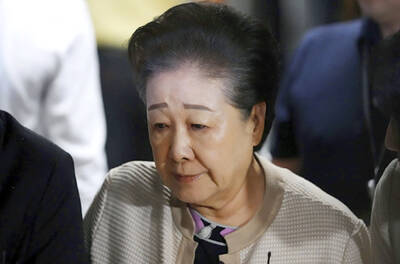
BRIBERY ALLEGATIONS: A prosecutor said they considered the risk of Hak-ja Han tampering with evidence to be very high, which led them to seek the warrant South Korean prosecutors yesterday requested an arrest warrant for the leader of the Unification Church, Hak-ja Han, on allegations of bribery linked to the country’s former first lady and incitement to destroy evidence. The move came a day after the 82-year-old was questioned over her alleged role in bribing former first lady Kim Keon-hee and a lawmaker. Founded in 1954 by her late husband, Sun Myung Moon, the Unification Church has long been the subject of controversy and criticism, with its teachings centered on Moon’s role as the “second coming” and its mass weddings. Followers are derisively referred to as “Moonies.” However, the church’s